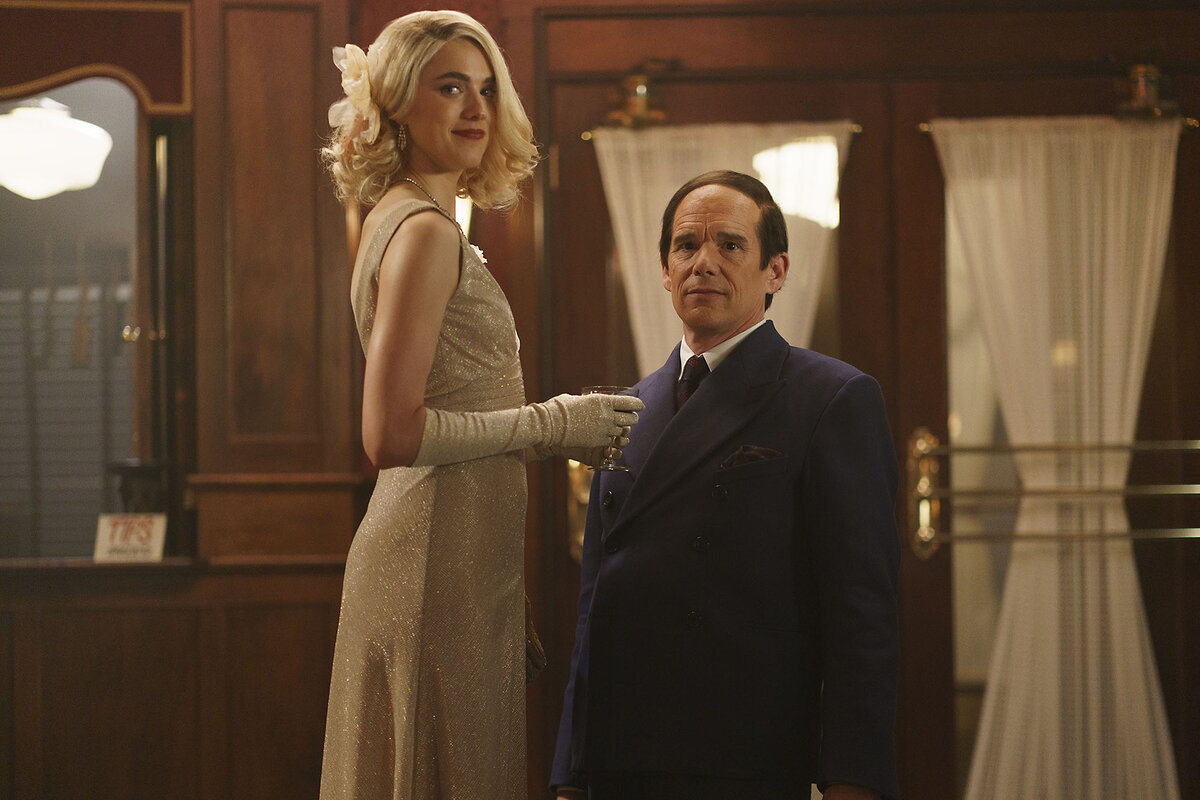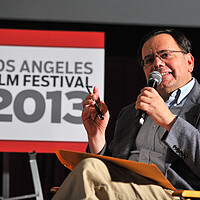Hart wrote some of the most aching lyrics of all time. Then musicals left him behind.
Loading...
Hollywood has always been overly fond of depicting the lives of creative artists as deeply troubled. Geniuses, apparently, must be shown to suffer for their art.
One artist, however, who definitely did live such a life was Lorenz Hart, the subject of the mostly marvelous new Richard Linklater movie ŌĆ£Blue Moon,ŌĆØ starring Ethan Hawke. It opens with a quote from the great cabaret singer Mabel Mercer, who said that Hart was ŌĆ£the saddest man I ever knew.ŌĆØ
Known affectionately as ŌĆ£Larry,ŌĆØ Hart was one half of the Broadway musical theater dream team of (Richard) Rodgers and Hart. He was responsible for some of the most pungent and expressive showbiz lyrics of all time, including not only but also such classics as ŌĆ£My Funny Valentine,ŌĆØ ŌĆ£The Lady Is a Tramp,ŌĆØ ŌĆ£Bewitched, Bothered and Bewildered,ŌĆØ and ŌĆ£IsnŌĆÖt It Romantic?ŌĆØ
Why We Wrote This
Director Richard Linklater offers a poignant portrait of legendary lyricist Larry Hart in his new film ŌĆ£Blue Moon.ŌĆØ
Together Rodgers and Hart collaborated on more than two dozen musicals. But HartŌĆÖs alcoholism and emotional disruptions eventually undid the partnership. Rodgers moved on, collaborating with Oscar Hammerstein II on a string of colossal hits, starting with ŌĆ£Oklahoma!ŌĆØ that eclipsed even his work with Hart. Eight months after ŌĆ£Oklahoma!ŌĆØ opened, Hart died, in his late 40s.
ŌĆ£Blue Moon,ŌĆØ scripted by Robert Kaplow ŌĆō who also wrote the novel ŌĆ£Me and Orson Welles,ŌĆØ which was turned into a vastly underrated Linklater movie of the same name ŌĆō takes place almost entirely in one night. The March 31, 1943, premiere of ŌĆ£Oklahoma!ŌĆØ has just let out and its cast and creators are heading to a celebration at SardiŌĆÖs, the famed theater district hangout. Hart, who attended the premiere, left for the party before the final act. He is already ensconced on a barstool as the celebrants, including Rodgers and Hammerstein, file in. He masks his boozy bitterness with an all-too-transparent bonhomie. He knows ŌĆ£Oklahoma!ŌĆØ will be a big hit ŌĆō bigger than any he had with Rodgers, played superlatively well here, with a complex blend of deep affection and diffidence, by Andrew Scott.
Hart even admires the show, in a way, as a perfect piece of kitsch. But he canŌĆÖt abide its all-American sunniness. His deep-down cynicism is roiled by a lyric like ŌĆ£the corn is as high as an elephantŌĆÖs eye.ŌĆØ He even objects to the exclamation mark in the musicalŌĆÖs title. What gives the movie much of its poignancy and power is HartŌĆÖs realization, and ours, that the asperity and regret showcased in his famous lyrics are no longer in fashion. He knows his time has passed.
Hawke is not the first actor I would have thought of to play Hart, who sported a glossy comb-over and measured under 5 feet tall. I canŌĆÖt say I entirely bought the transformation ŌĆō despite some unobtrusive camera placements and subtle facial prosthetics ŌĆō but Hawke gives it his all. He and Linklater have worked together on nine movies, including the great ŌĆ£BeforeŌĆØ trilogy, and their creative simpatico is obvious. HawkeŌĆÖs Hart talks almost nonstop in ŌĆ£Blue Moon,ŌĆØ and yet I never tired of listening to his patter. What he says, so often at odds with how he feels, issues from a hurt place.
His psychological contradictions play out in full force. Although discreetly gay, he is rapturously in love with one of the partygoers, Elizabeth Weiland, played by the extraordinary Margaret Qualley. He has been corresponding with her, a Yalie socialite, and she, ambitious but kindly, indulges his affections. At first she comes across as flighty, but a scene between her and Hart in a cloakroom near the end bares their romantic souls. We can see how both of these people, in their separate ways, are caught up in a forlorn, unattainable love. Hart disparages ŌĆ£Oklahoma!ŌĆØ in the movie for being nostalgic about a world that never existed. But the yearning in many of his best lyrics is for an unrequited ardor that is equally beyond reach.
ŌĆ£Blue MoonŌĆØ may essentially take place inside a single room, but it rarely feels stagy. It captures the connivance and conviviality of theater people ŌĆō the way they come together, if only for a night, with a spiritedness that is both forced and entirely genuine. A success like ŌĆ£Oklahoma!ŌĆØ makes them feel anointed.
It is in this giddy maelstrom that Hart, at long last, seems most at home ŌĆō and most alone.
Peter Rainer is the MonitorŌĆÖs film critic. ŌĆ£Blue MoonŌĆØ is rated R for language and sexual references.








